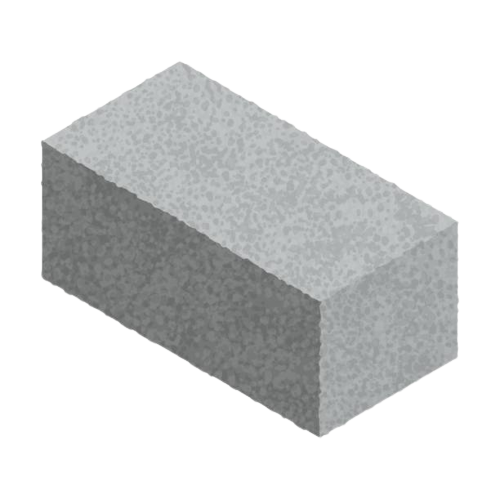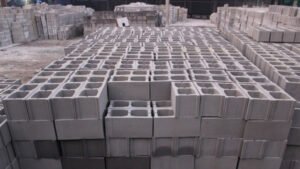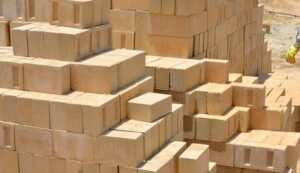Table of Contents
Introduction to Concrete Blocks
Concrete blocks, also recognized as cinder blocks or cement blocks, play a pivotal role in the construction industry in India. Their widespread use stems from attributes such as durability, strength, and affordability. This article delves into the intricacies of concrete blocks, exploring their advantages, disadvantages, and the thriving business associated with their production in India.

The Strength and Durability of Concrete Blocks
Concrete blocks derive their strength from a blend of cement, sand, and water. The resulting mixture is molded into a rectangular shape and left to dry. These blocks excel in supporting heavy loads, making them ideal for foundational and structural elements. Moreover, their fire-resistant properties make them a preferred choice in regions prone to wildfires.
Affordability and Ease of Installation
A key advantage of concrete blocks lies in their cost-effectiveness. In comparison to materials like brick or stone, they are budget-friendly to produce and purchase. Their easy installation further reduces labor costs, expediting construction timelines. Additionally, the porous nature of concrete blocks provides insulation, regulating temperature and humidity within buildings, resulting in energy savings.
Mitigating Challenges
However, challenges exist. The weight of concrete block can complicate installation, and their utilitarian appearance may not suit all architectural styles. Moisture absorption is another concern, potentially leading to mold growth and structural issues over time. Yet, these challenges can be addressed through proper installation techniques and mitigation measures.
Concrete Blocks Making Business in India
Concrete blocks hold a significant position in the construction landscape of India. With a burgeoning population and increasing urbanization, the demand for these blocks has witnessed a substantial upswing. This section explores the business landscape, manufacturing process, and growth prospects in the Indian market.
Diverse Landscape of Manufacturers
The concrete block manufacturing business in India is diverse, encompassing small-scale enterprises to large-scale industry leaders. While numerous small and medium-sized players contribute to the market, a few prominent companies dominate, supplying high-quality concrete block for large-scale projects.
Manufacturing Process
The production of concrete blocks involves meticulous steps. Cement, sand, aggregate, and water are mixed in a batching plant, molded into blocks of desired dimensions, and subsequently cured and dried. Success in this business requires a well-established brand, a reliable supply chain, and a robust distribution network. Emphasis on high-quality raw materials, advanced technology, and stringent quality control further contributes to success.
Growth Prospects in India
The demand for concrete blocks in India is set to grow steadily, fueled by housing needs, infrastructure development, and government initiatives promoting affordable housing. Entrepreneurs and investors eyeing opportunities in the concrete block manufacturing business should prioritize quality, innovation, and customer service to establish themselves as industry leaders.
Sizes of Concrete Blocks Used in India
Concrete block in India come in various sizes, each tailored for specific construction purposes. Understanding these sizes is crucial for ensuring the right blocks are used for the intended applications.
Common Sizes and Applications
- 400 x 200 x 200mm: Standard size for load-bearing walls and foundations.
- 400 x 150 x 200mm: Used for non-load bearing walls and partitions.
- 400 x 100 x 200mm: Smaller size for boundary and garden walls.
- 600 x 200 x 200mm: Larger size suitable for load-bearing walls in commercial and industrial buildings.
- 300 x 200 x 150mm: Commonly used for retaining walls and foundations in residential buildings.
It’s important to note that these sizes are general guidelines, and variations may occur based on project-specific requirements.
Concrete Block Making Machines
Specialized equipment for producing concrete blocks plays a pivotal role in the construction industry. Understanding the types of machines, their functionalities, and factors influencing the choice is vital for efficient block production.
Machinery Overview
Machines for making concrete blocks typically comprise a hopper, mixer, conveyor belt, or chute, and a mold. The choice between manual, semi-automatic, and fully automatic machines depends on production requirements and budget constraints. These machines are versatile, capable of producing not only concrete block but also other products like pavers, hollow blocks, and bricks.
Considerations When Choosing Machines
Selecting the right machine involves evaluating factors such as production capacity, ease of operation, maintenance requirements, and cost. Quality assurance is paramount, necessitating purchase from reputable manufacturers with a history of producing reliable equipment.
Conclusion
In conclusion, machines for making concrete block are indispensable in the construction industry, offering a cost-effective means to produce high-quality blocks. With a plethora of machines available, users can align their choices with production needs and financial considerations, ensuring optimal efficiency and product quality.




